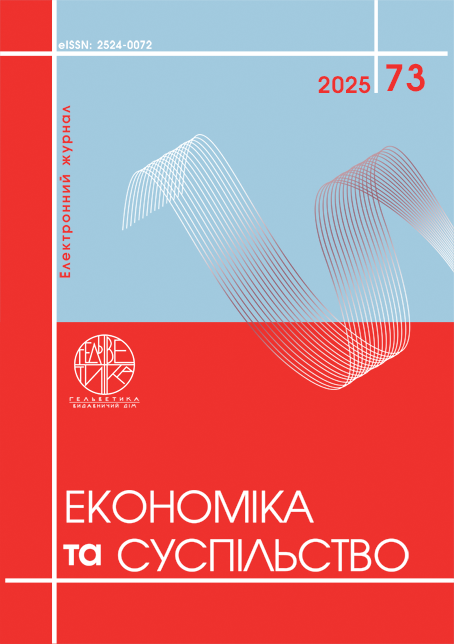THE INTERACTION OF GLOBALIZATION AND GLOCALIZATION: TRENDS OF CONVERGENCE AND DIVERGENCE IN THE 21ST CENTURY
Abstract
This article explores the mechanisms of interaction between globalization and glocalization amidst contemporary global transformations, particularly in the post-pandemic period, geo-economic shifts, and local resistance movements. The study addresses the urgent need to understand how countries adapt to global processes during crises such as wars, economic shocks, and environmental challenges. It identifies a gap in current development models that often fail to adequately account for the intricate relationship between the global and local, especially in unstable environments. The primary objective is to analyze the interplay between globalization and glocalization through a novel classification and conceptual model, with a specific focus on Ukraine. The research delves into the theoretical underpinnings of both phenomena, examines their multi-level interactions, and introduces new perspectives on their impact in today’s volatile world. Special attention is paid to Ukraine’s glocalization processes during wartime, exemplified by digital transformation (such as the “Diia” platform), the rise of local brands, and accelerated European integration. Four types of glocalization are identified based on the author’s classification: harmonious, resistant, integrative, and simulational. The proposed conceptual model of interaction enables the analysis of global and local dynamics by considering the intensity of global influence and the nature of local adaptation or resistance. This model enhances the understanding of transformation processes in various national and regional contexts, particularly under significant global pressures. The article emphasizes the necessity of an interdisciplinary approach, integrating economic, cultural, and political perspectives. In a rapidly evolving world that demands flexible development strategies, the study advocates for revising traditional globalization and glocalization models to make them more adaptable to both stable and unstable conditions. The research concludes by affirming the universality of the proposed model and its potential for application in diverse contexts. It also highlights its value for scientific inquiry, policymaking, and educational initiatives aimed at understanding global and local transformations. Future research directions are suggested, focusing on specific countries and regions through the lens of this model.
References
Економічні суперечності глобалізації та локалізації в умовах гібридної війни та післявоєнної реконструкції : монографія / [за ред. А. А. Гриценка] ; НАН України, ДУ «Інститут економіки та прогнозування НАН України». – Київ : Ін-т екон. та прогнозув. НАН України, 2022. – 636 с.
Асатуров С. Г., Мартинов А. В. Глобалізація та глокалізація в умовах кризи світової системи міжнародної безпеки // Acta De Historia & Politica: Saeculum XXI. – 2022. – № 4. – С. 119–127.
Бурлай Т. Ю., Гриценко А. А., Борзенко О. В. Суспільні наслідки сучасної гібридної війни: ключові виміри в контексті України // Journal of European Economy. – 2023. – Т. 22, № 2. – С. 158–183.
Піляєв І. С. Трансформація процесів глобалізації в контексті наслідків повномасштабного вторгнення Росії в Україну // Економіка України. – 2024. – № 7 (728). – С. 3–20.
Робертсон Р. Глобалізація: соціальна теорія та глобальна культура. – Київ : Основи, 2003. – 284 с.
Аппадурай А. Сучасність у великому масштабі: культурні виміри глобалізації. – Київ : Ніка-Центр, 2008. – 236 с.
Гідденс Е. Наслідки модернізації: глобалізація та ризики в сучасному світі. – Київ : Основи, 2001. – 216 с.
Рітцер Д. Макдоналдизація суспільства. – Київ : Основи, 2005. – 360 с.
Рітцер Д. Глобалізація: основні концепції. – Київ : Основи, 2007. – 368 с.
Бауман З. Глобалізація: наслідки для людини. – Київ : Основи, 2002. – 160 с.
Хофман Т., Чеботарьова А., Кратохил А., Шмід У. Літературні медіаскейпи в Україні // У: Шмід У., Мишловська О. (ред.). Регіоналізм без регіонів: переосмислення гетерогенності України. – Будапешт : Amsterdam University Press, 2019. – С. 219–246.
Robertson R. Glocalization: Time-Space and Homogeneity-Heterogeneity // In: Featherstone M., Lash S., Robertson R. (Eds.). Global Modernities. – London : SAGE, 1995. – P. 25–44.
Ritzer G. The Globalization of Nothing 2. – Thousand Oaks, CA : Pine Forge Press, 2007. – 216 p.
Roudometof V. Glocalization: A Critical Introduction. – New York : Routledge, 2016. – 196 p.
Hrytsenko, A. A. (Ed.). (2022). Ekonomichni superechnosti hlobalizatsii ta lokalizatsii v umovakh hibrydnoi viiny ta pisliavoiennoi rekonstruktsii [Economic contradictions of globalization and localization under hybrid war and postwar reconstruction]. Kyiv: Institute of Economics and Forecasting of the NAS of Ukraine.
Asaturov, S. H., & Martynov, A. V. (2022). Hlobalizatsiia ta h lokalizatsiia v umovakh kryzy svitovoi systemy mizhnarodnoi bezpeky [Globalization and glocalization under the crisis of the global security system]. Acta De Historia & Politica: Saeculum XXI, (4), 119–127.
Burlai, T. Yu., Hrytsenko, A. A., & Borzenko, O. V. (2023). Suspilni naslidky suchasnoi hibrydnoi viiny: kliuchovi vymiry v konteksti Ukrainy [Social consequences of the modern hybrid war: key dimensions in the context of Ukraine]. Journal of European Economy, 22(2), 158–183.
Piliayev, I. S. (2024). Transformatsiia protsesiv hlobalizatsii v konteksti naslidkiv povnomasshtabnoho vtornuennia Rosii v Ukrainu [Transformation of globalization processes in the context of Russia’s full-scale invasion of Ukraine]. Ekonomika Ukrainy, 7(728), 3–20.
Robertson, R. (2003). Hlobalizatsiia: Sotsialna teoriia ta hlobalna kultura [Globalization: Social theory and global culture]. Kyiv: Osnovy.
Appadurai, A. (2008). Suchasnist u velykomu mashtabi: Kulturni vymiry hlobalizatsii [Modernity at large: Cultural dimensions of globalization]. Kyiv: Nika-Tsentr.
Giddens, A. (2001). Naslidky modernizatsii: Hlobalizatsiia ta ryzyky v suchasnomu sviti [The consequences of modernity: Globalization and risks in the modern world]. Kyiv: Osnovy.
Ritzer, G. (2005). Makdonaldyzatsiia suspilstva [The McDonaldization of society]. Kyiv: Osnovy.
Ritzer, G. (2007). Hlobalizatsiia: Osnovni kontseptsii [Globalization: The essentials]. Kyiv: Osnovy.
Bauman, Z. (2002). Hlobalizatsiia: Naslidky dlia liudyny [Globalization: The human consequences]. Kyiv: Osnovy.
Hofmann, T., Chebotariova, A., Kratokhvil, A., & Schmid, U. (2019). Literary mediascapes in Ukraine. In U. Schmid & O. Myshlovska (Eds.), Regionalism without regions: Rethinking Ukraine’s heterogeneity (pp. 219–246). Budapest: Amsterdam University Press.
Robertson, R. (1995). Glocalization: Time-space and homogeneity-heterogeneity. In M. Featherstone, S. Lash, & R. Robertson (Eds.), Global modernities (pp. 25–44). London: SAGE.
Ritzer, G. (2007). The globalization of nothing 2. Thousand Oaks, CA: Pine Forge Press.
Roudometof, V. (2016). Glocalization: A critical introduction. New York: Routledge.

This work is licensed under a Creative Commons Attribution 4.0 International License.


